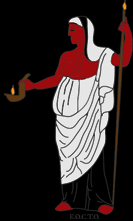
Festival of Anthesteria: Khoes (Pitcher Feast)
February 26
This is the “Festival of Flowers,” when the first shoots of blossom appear, and is one of the oldest Greek festivals, dating back to the second millennium BCE; it was also called the Older Dionysia. At this time the vines are pruned again and the second fermentation of the wine is complete; it is now ready for drinking, and so this festival complements the Oskhophoria (c. Oct. 22), which celebrates the vintage.
On this day all the temples of the gods are closed except the Limnaion, the temple of “Dionysos in the Marshes” (limnais, though there may be no marshes present), which is only open during this festival. Thus the underworld spirits are free to roam and join the feasts of the living. For protection people paint pitch on their doors and chew buckthorn in the morning; business is suspended and no oaths are sworn.
Also on this day it is customary that everyone at least three years old drinks wine. (Children are expected to participate because of their connection to fertility.) Everyone, including the children, has their own khoes (pitchers, 2-liter for adults) and drinking cups for wine, often purchased at the festival. The khous has a round body, short neck and trefoil mouth. This is a very child-oriented festival, and a child’s first Khoes is one of the major milestones of life: Birth, Khoes, Puberty and Marriage. He or she is crowned with flowers and might be given a khous, as well as other gifts, such as toys and pets; teachers often invite their pupils to a reception. This is a day for drinking parties, both public and private. Distinguished people are invited by the high priest of Dionysos to a public drinking contest. A trumpet signals the start of the contest, during which no one may speak (for at this time people are cut off from one another as from all other gods but Dionysos). The victory goes to the first to empty his khous, who is awarded a full wineskin. Private contests are similar, but the prize is a cake.
Participants bring their own food, cups and khoes, already filled with mixed wine (from the Pithoigia); the host provides the garlands, perfume and dessert. After the contests, they put their garlands around their khoes and proceed to the Limnaion, where they give their garlands to the priestess. There they all thank Dionysos by pouring a libation for Dionysos of the last of the wine from their khoes.
